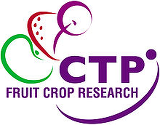October 2018 – September 2023
Chris Cook

Apple replant disease (ARD) causes significant economic losses across all major apple-growing regions worldwide. The disease etiology is not well defined and expresses as the poor growth of newly planted trees. This problem is exacerbated in Europe by the removal of several effective chemical soil fumigants. Recent results at NIAB EMR suggested that ARD is likely to be caused by several organisms: lack of specific beneficial microbes (particularly bacteria), fungal and oomycetes pathogens, and exacerbated by nematodes. Thus, in the absence of broad-spectrum fumigants, reducing ARD requires careful soil management to improve soil structure (particularly microbiota), especially in nurseries where young trees are grown in a high density.
In this project, Chris is trying to understand how various soil management practices (including amending soils with specific microbes) will impact soil quality in terms of ARD and canker development. In addition, he is also studying soil microbial dynamics under climate change scenarios: combinations of elevated CO2 x temperature x water potential stress.
Research progress
Understanding resilience of soil microbes to climate change senarios
We assessed the effect of exposing apple orchard soil to different temperatures and CO2 levels on the resident microbiome of soils at two different depths from a conventionally managed and an organically managed apple orchard. The key difference between these two orchards was that synthetic fertilizers and pesticides are routinely used in the former one.
To investigate the effect of CO2 and temperature soil samples from each site and depth were exposed to elevated temperature (29 oC) at either 5,000 or 10,000 ppm for 5 weeks or exposed to control conditions (25 oC + 400 ppm). Both bacterial and fungal communities were profiled with amplicon-sequencing. The differences between the two orchards were the most significant factor affecting both bacterial and fungal communities contributing to 53.7% and 14.0% of the variance in Bray-Curtis β diversity respectively. The effects of both elevated CO2 concentrations and increased temperature affected fungal and bacterial diversity in the organic site more than in conventional soils. A number of candidate beneficial and pathogenic microorganisms include Pseudoxanthomonas, Janthinobacterium, Nocardioides, Pseudomonas, Variovorax, Massilia, Streptomyces, Burkholderia, Mucilaginibacter, and Trichoderma had differential abundance when temperature and CO2 were elevated; but their effect on the plant is unclear.
This study has highlighted that microbial communities in bulk soils are most significantly influenced by crop management practice compared to the climate conditions used in the study. The studied climate conditions had a limited effect on microbial communities in conventionally managed soils than in organically managed soils.
